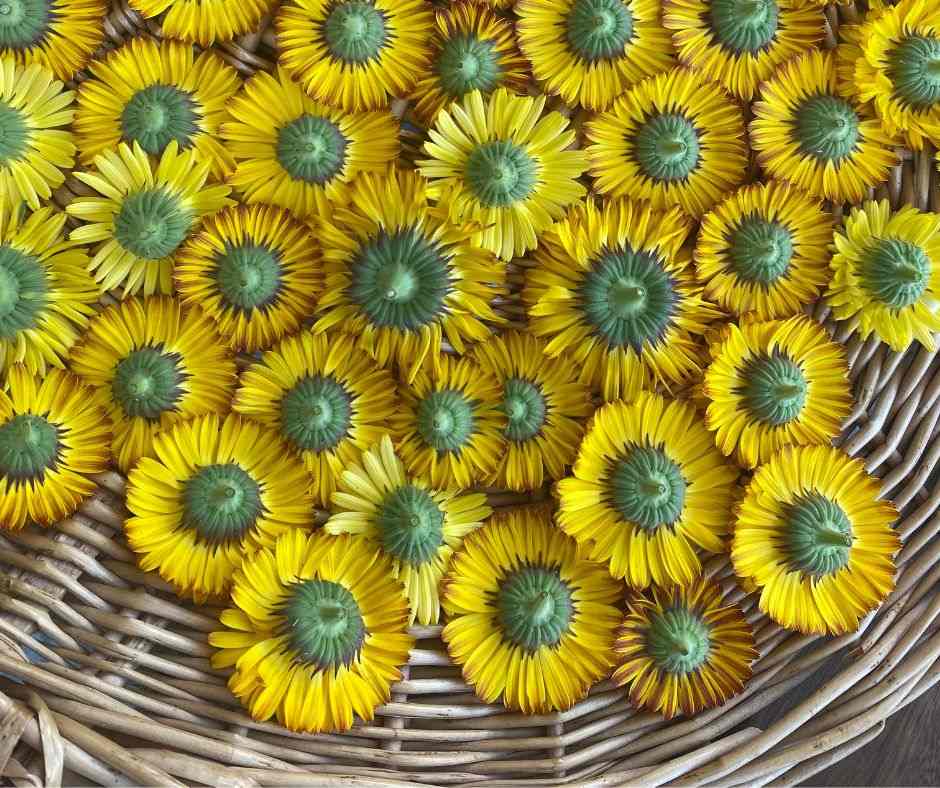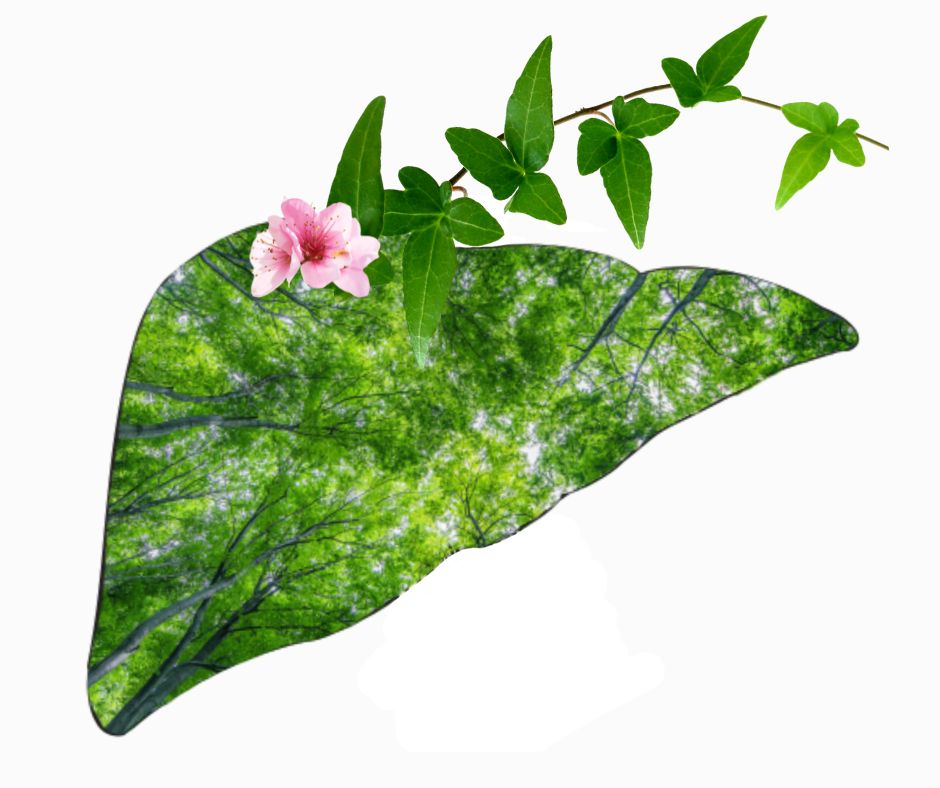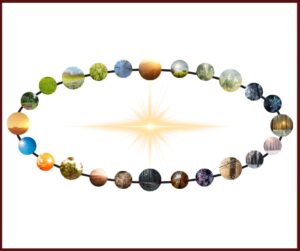 Many earth-based wisdom systems recognize the need to participate with, rather than work against, the changing tides of the seasons. When we live in harmony with seasonal change we foster greater well-being.
Many earth-based wisdom systems recognize the need to participate with, rather than work against, the changing tides of the seasons. When we live in harmony with seasonal change we foster greater well-being.
Through observation of the natural world, the ancient Chinese created a calendar system that has 24 seasonal points based on the way the sun moves in an annual circular motion. Each time period is approximately two weeks. You can think of these solar terms as mini-seasons.
Each solar term represents the unique weather pattern present at that time of year and has specific traditions associated with it. Learn more about all of the solar terms here.
Solar terms or seasonal points reflect climatic and environmental changes that happen as the seasons shift. Chinese Medicine (TCM) emphasizes the need to alter our behaviour based on the external environment to maintain health and vitality and avoid disease. So we can use the solar terms as guideposts when harmonizing our diet and lifestyle choices to match the natural world.
Solar Terms or Seasonal Points for Winter
In today’s post, we’ll explore the seasonal points associated with winter. Be sure to check out this post for general info on the seasonal points and these for information on the solar terms of spring, the solar terms of summer, and the solar terms for fall.
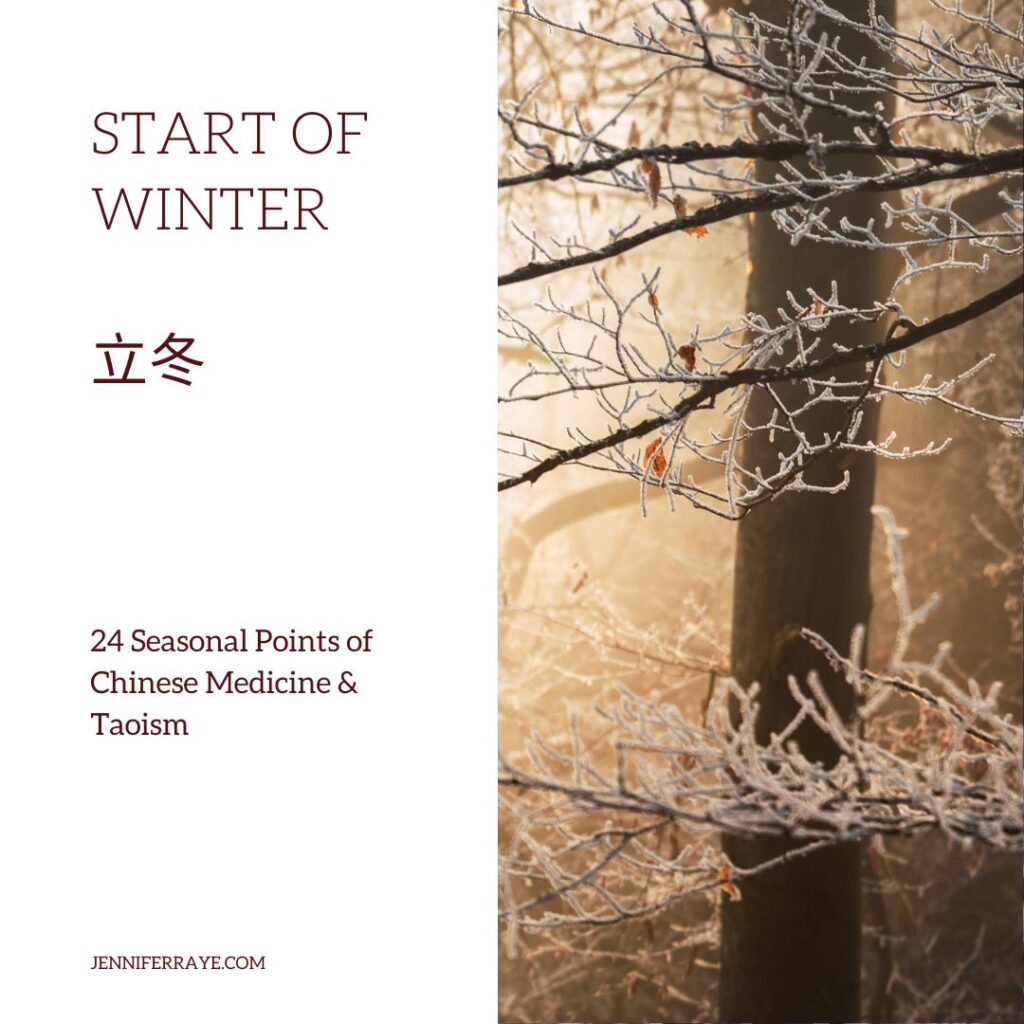
Beginning of Winter – lì dōng – 立冬 – Nov.7th – Nov.21st
The 19th seasonal point of the calendar marks the beginning of winter, although in many places there are still a few more weeks before deep winter sets in. This is when the sun reaches 225 degrees. Plants die back, and insects hide. Nature is at rest in preparation for the vital growth of spring. During winter, Qi and Yang sinks into the deepest layers of the body. It’s time to rest and rejuvenate, protect against cold disorders, nourish our yang, and guard our deepest yin.
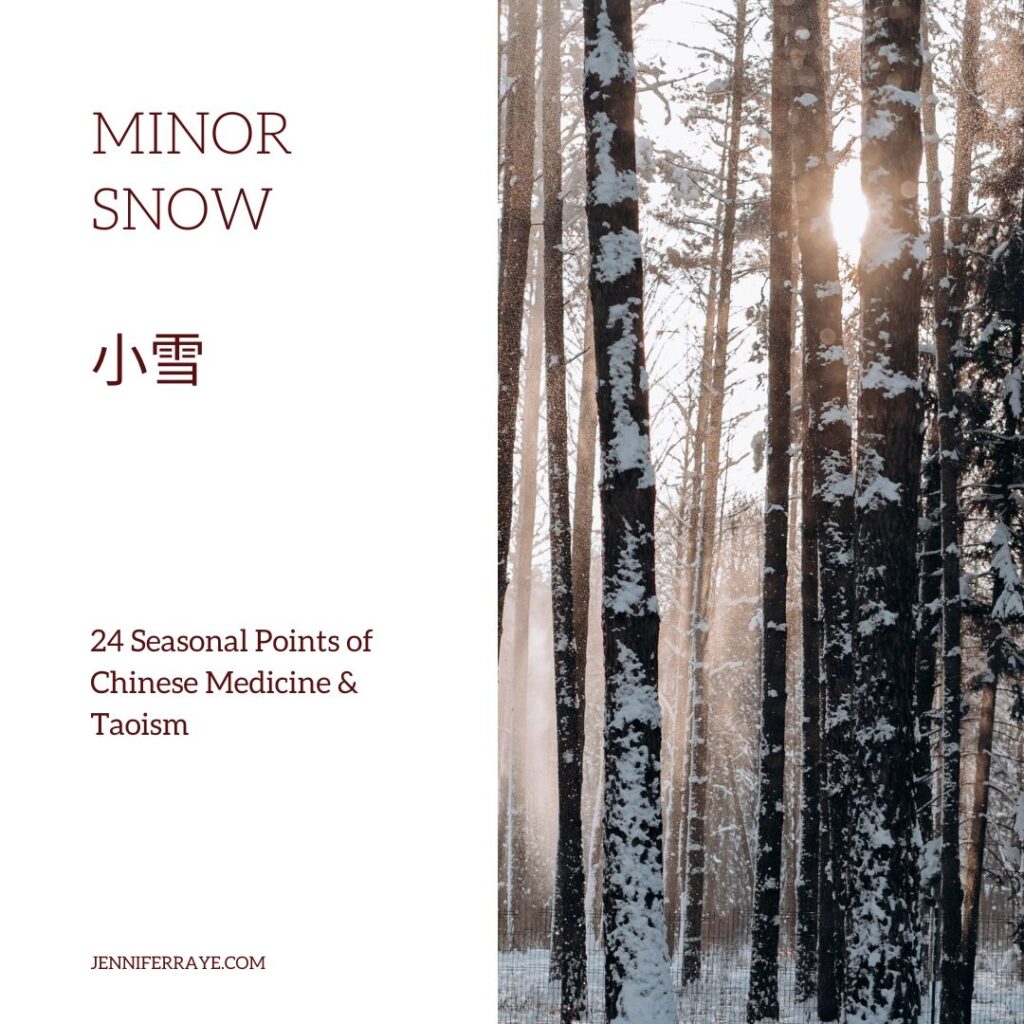
Minor Snow – xiǎo xuě – 小雪 – Nov.22nd – Dec.5th
In this stage of the cycle, snow may begin to fall. Although it may only be a small amount of snow, it is a warning sign to start making changes for the winter ahead. The land becomes quiet, cold, and dormant. Animal movements slow, water turns to ice, and plants store energy in their roots. Winter is water element time and is considered the most yin phase of the five-element cycle which makes it slower, inward, downward, and more feminine.
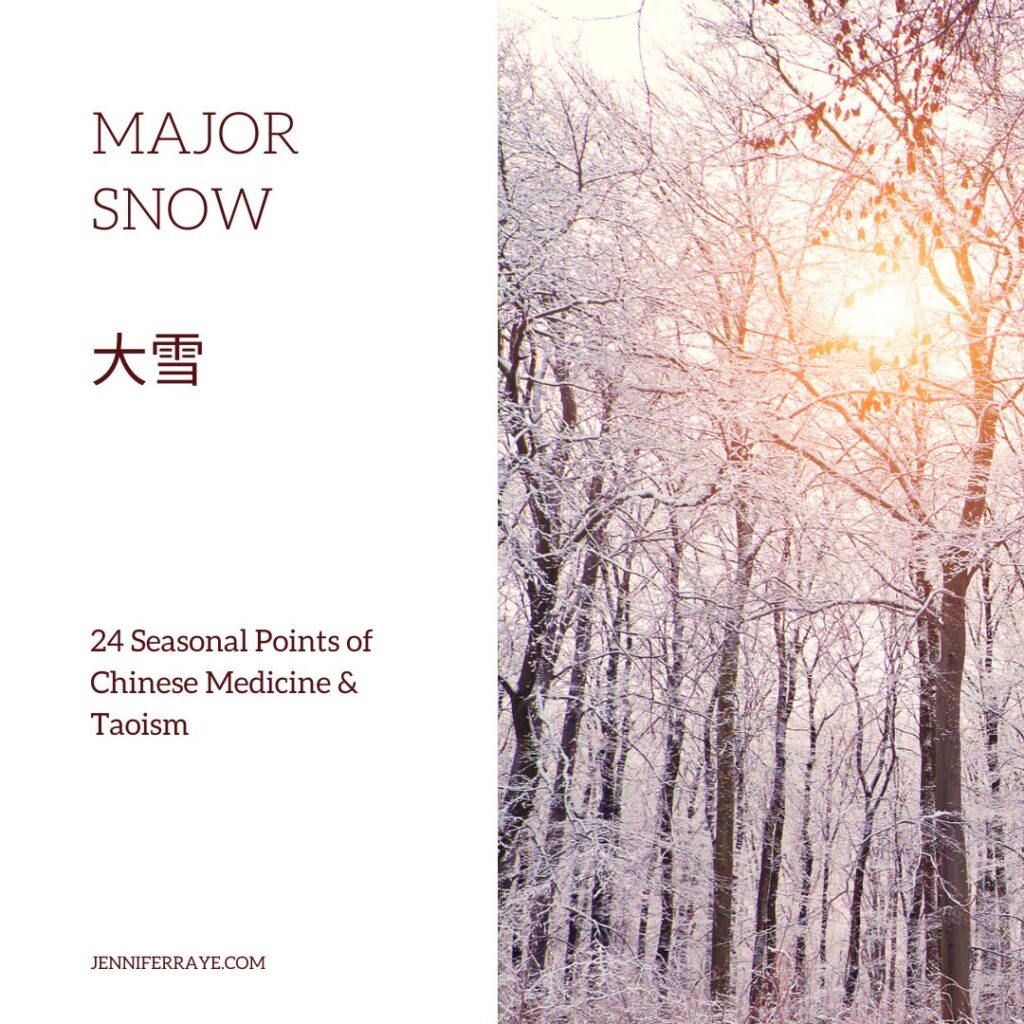
Major Snow – dà xuě – 大雪 – Dec.6th – Dec.20th
During this seasonal point, snow may start to fall more heavily. During winter we need to protect our jing (essence). Jing is both a physical and energetic concept—in its most physical form it is the sperm and ovum—at its most energetic, it is our deepest life force. It is a nourishing energy housed in the Kidneys that provides deep strength and resilience. Jing is depleted with overactivity, so one way to protect this vital substance is with rest and sleep.
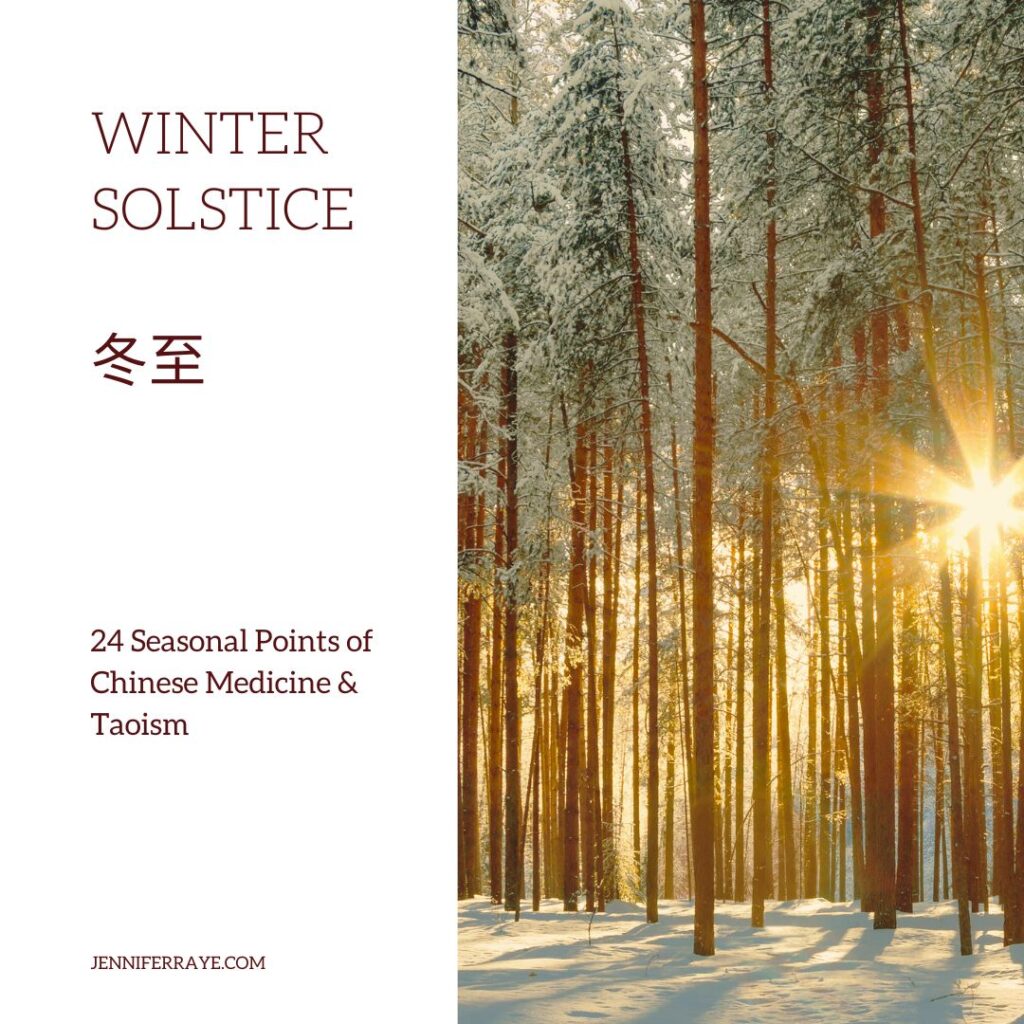
Winter Solstice – dōng zhì – 冬至 – Dec.21st – Jan.4th
During this seasonal point we have our longest nights. During the darkest days of the year, we can cultivate wisdom through receptivity and reflection. The quiet hush of winter can show us there is real potency available in darkness. This time of stillness and slowing down helps us nourish new seeds of potential, move toward the light within, and face our fears – the emotion related to this time of year.
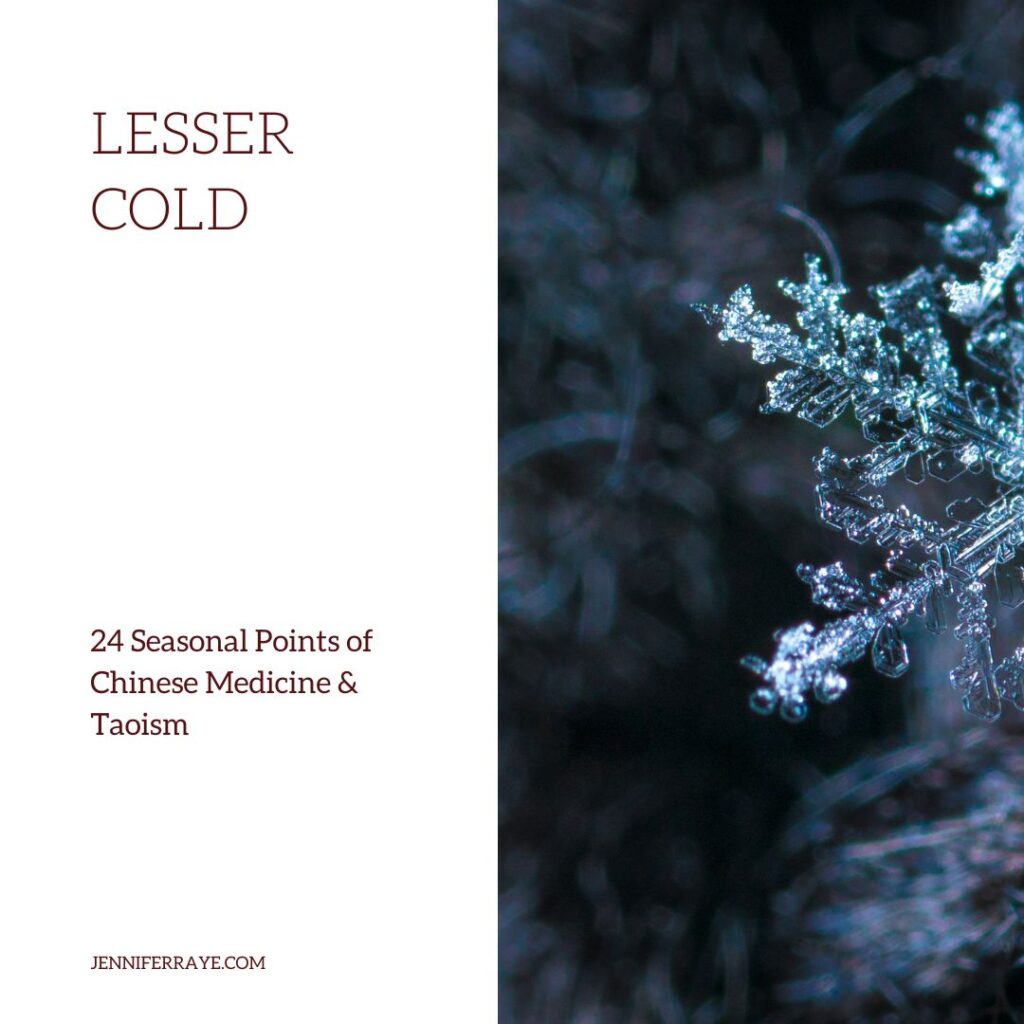
Lesser Cold – xiǎo hán – 小寒 – Jan.5th – Jan.19th
At this time, the weather quickly becomes cold. In Chinese Medicine, the environmental factor that tends to cause diseases most easily in winter is “cold” 寒. There are two types of cold – external and internal. Internal Cold is due to a lack of yang in the body, and external Cold can be from the environmental pathogen “cold” attacking the body. Self-care practices should generate warmth, without drying or overheating. In particular keep the head, lower back, and chest warm.
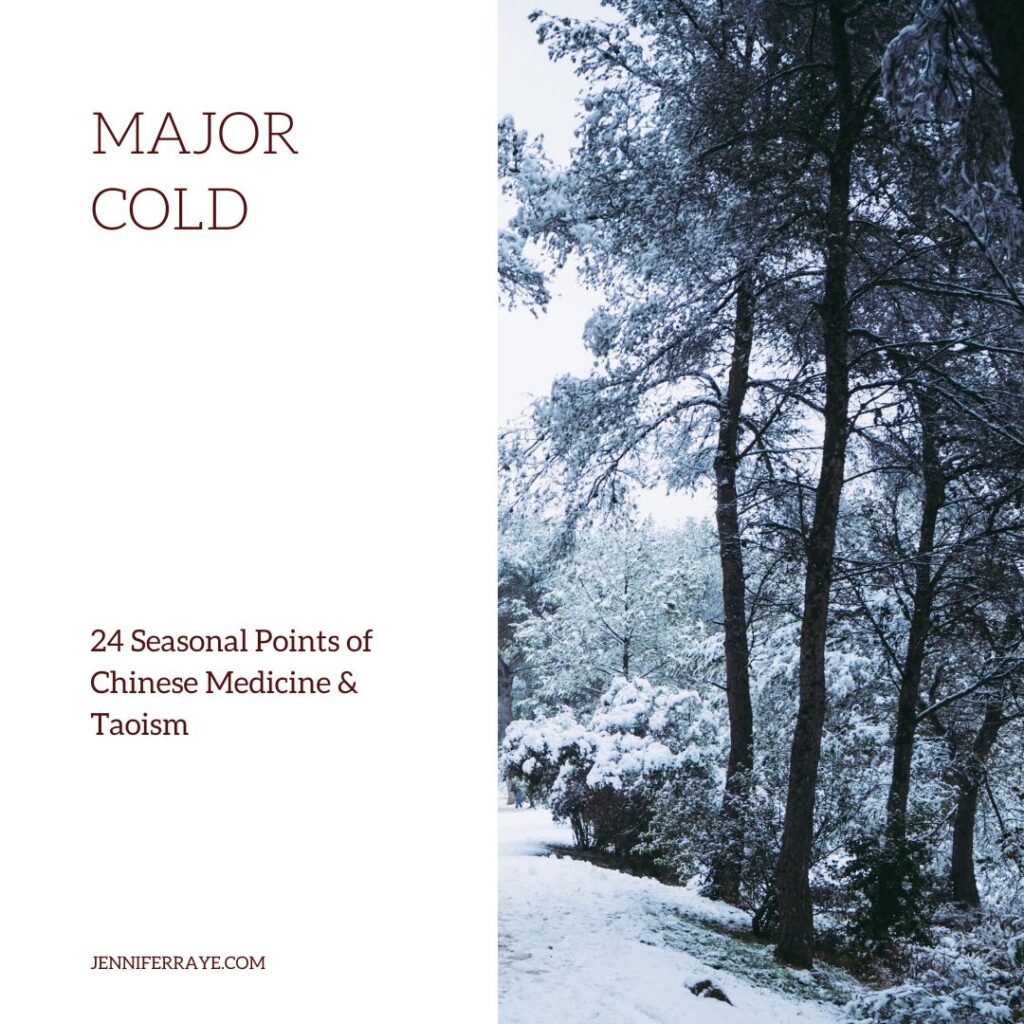
Greater Cold – dà hán – 大寒 – Jan.20th – Feb.3rd
This is considered the coldest time of year. Energy slows now due to cold, so while it’s important to warm the body this time of year, it’s also important to not allow stagnancy to build. Avoid a sedentary lifestyle by getting regular exercise, especially in late winter.
Seasonal Energetics for Winter Solar Terms
ELEMENT: Water
ORGANS: Kidney / Bladder / Adrenals
In Chinese Medicine, the Kidneys and Urinary Bladder are the organs that represent the potent energy of this season. The kidneys are located at the lower back, above the waist, partly behind the lower ribs; they filter an enormous amount of blood every day, and they regulate fluids. Waste from the kidneys travels via the ureters to the bladder for excretion. Kidneys are extremely important to physical functioning—the body can survive with just a single kidney, but if both kidneys fail, one doesn’t have the ability to eliminate wastes, which leads to death. The bladder is a stretchable sac located just behind the pubic bone; it stores and eliminates urine.
Together, these organs determine the overall movement of fluids, and the balance of water and minerals in the body. Some of these minerals will be used to support and create the marrow and bones. The two adrenal glands, also related to water element energy, sit on top of each kidney. The adrenals release hormones that help to regulate blood sugar and mineral levels, along with hormones that work together to first activate, then counteract, the stress response.
COOKING: During the colder months, warming meals that are sweet and yang-building should be emphasized. Salty and bitter flavors consolidate Qi in the Kidneys, and encourage the natural sinking and centering happening in the winter. Warming spices, foods, and cooking methods along with small amounts of medicinal wines help to warm the body. Warming pungent flavors also move Qi and protect against cold stagnation.
A few cooking tips for winter:
- Eliminate or reduce cold foods and drinks
- Eat warming/Building/Sweet foods – whole grains, oats, roasted nuts, dried foods, small dark beans, leeks, steamed winter greens, walnuts, root veggies, squash, seeds, natural sweeteners, dates, dairy, meat, legumes
- Make warming soups – Slow cooking, soups, and stews extract nourishment and support yin, yang, and Qi. Traditionally animal products are used to supplement the deep reserves in the body, so something like a bone broth (if you consume animal products) is especially helpful.
- Use foods that protect the Kidneys and Jing – black/kidney beans, seaweed, black sesame, and animal products.
- Add a little more salty flavour in early winter, and stimulating/pungent spices (especially if you’re cold or feeling stagnant): miso, soy sauce, seaweeds, salt, millet, barley, cloves, ginger, and cinnamon.
- Try this winter chai cooking video
SELF-CARE: Winter is a time to heal through rest. What if we cooperated with this ancient rhythm of darkness? In addition to gathering with loved ones and enjoying the warmth and connection of the season, could we also rest and dream deeply?
This is when Qi drops into the deep tissue layers and we can soak in the healing power of darkness. Stillness and slowing down, supported by darkness, help us develop and connect with the deep life forces within.
A few ways to support yourself during the winter solar terms:
- Keep your lower back, head, chest and feet covered and warm.
- Go to sleep earlier. Relax into the impulse to rest more this time of year. Your body knows what it needs!
- Treat yourself to a warm bath. Bonus points if you do a self-oil massage first (called abhyanga massage in Ayurveda). This will help to soothe the nervous system, ease stress, and support your Kidney Yang.
- Practice meditation daily and Yoga Nidra (yogic sleep)
- Do yoga for your lower back and yoga for Kidney Qi
- Turn off house lights and hang out by firelight in the evening
- Use an eye mask during savasana (resting pose at the end of yoga)
- Give more time to complete tasks
- Don’t schedule too many evening engagements
I hope this gives you some good ideas on how to work with the solar terms using Chinese Medicine! Be sure to check back at this page for more seasons as I release them, and if you’re not on my mailing list get on it here to get updates as I release them!




